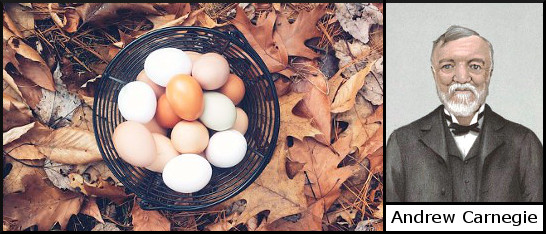Mark Twain? Andrew Carnegie? Anonymous?
Question for Quote Investigator: Proverbial wisdom tells us never to put all our eggs in one basket, but an inversion of that advice has been ascribed to the renowned humorist Mark Twain and the business titan Andrew Carnegie. Who should receive credit?
Reply from Quote Investigator: On June 23, 1885 Andrew Carnegie addressed the students of Curry Commercial College of Pittsburgh, Pennsylvania. He gave pungent guidance to the learners which included a repudiation of the traditional adage about baskets and eggs. Emphasis added to excerpts by QI:1
The concerns which fail are those which have scattered their capital, which means that they have scattered their brains also. They have investments in this, or that, or the other, here, there and everywhere. “Don’t put all your eggs in one basket” is all wrong. I tell you “put all your eggs in one basket, and then watch that basket.” Look round you and take notice; men who do that do not often fail. It is easy to watch and carry the one basket. It is trying to carry too many baskets that breaks most eggs in this country. He who carries three baskets must put one on his head, which is apt to tumble and trip him up. One fault of the American business man is lack of concentration.
The text above was from a collection of speeches and essays published by Carnegie in 1902. The date and location of the speech were specified in the book. Contemporaneous news accounts also mentioned the event. For example, on August 19, 1885 “The Yonkers Statesman” of Yonkers, New York described the talk under the title “Success in Business”. The phrasing varied: “I tell you” versus “We tell you”, but the adage was identical:2
“Don’t put all your eggs in one basket” is all wrong. We tell you “put all your eggs in one basket, and then watch that basket.”
Mark Twain heard about Carnegie’s remark, and he was intrigued enough to record it in one of his notebooks. Later, he employed the reversed adage as a chapter epigraph in his tale titled “Pudd’nhead Wilson”. Below are additional selected citations in chronological order including detailed citations for Twain.
Continue reading “Quote Origin: Put All Your Eggs in One Basket, and Then Watch That Basket”

